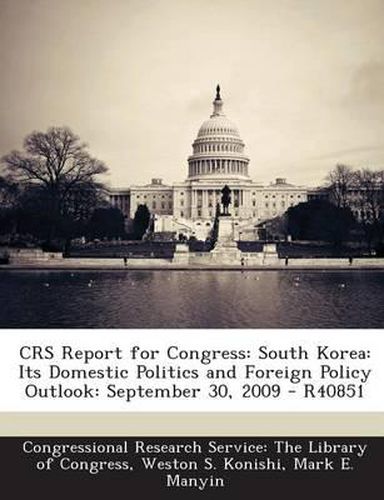Readings Newsletter
Become a Readings Member to make your shopping experience even easier.
Sign in or sign up for free!
You’re not far away from qualifying for FREE standard shipping within Australia
You’ve qualified for FREE standard shipping within Australia
The cart is loading…






South Korea’s maturing democracy and rapid economic development have had a significant impact on its external relations, including the strategic and economic relationship with the United States. After decades of close strategic alignment with the United States under authoritarian governments, the past several democratically elected leaders in Seoul have sought their own brand of foreign policy and relations with the United States. Now the 13th largest global economy, South Korea is a major U.S. trade partner and host to some 37,000 forward deployed U.S. troops. President Lee Myung-bak entered office in 2008 planning to upgrade ties with the United States and carry out other ambitious proposals, but faced multiple political challenges early in his administration. One initial crisis was the massive anti-government protests against the April 2008 U.S.-Korea beef deal. Lee’s approval ratings fell to the 20%-30% level, although his ratings had returned to the 40-50% range in the early fall of 2009 due to improved economic forecasts. Many experts agree his political support remains fragile, including within his Grand National Party (GNP), which controls South Korea’s unicameral National Assembly. Lee’s clout may be limited by his early “lame duck” status; by law, South Korean presidents are limited to one, …
$9.00 standard shipping within Australia
FREE standard shipping within Australia for orders over $100.00
Express & International shipping calculated at checkout
South Korea’s maturing democracy and rapid economic development have had a significant impact on its external relations, including the strategic and economic relationship with the United States. After decades of close strategic alignment with the United States under authoritarian governments, the past several democratically elected leaders in Seoul have sought their own brand of foreign policy and relations with the United States. Now the 13th largest global economy, South Korea is a major U.S. trade partner and host to some 37,000 forward deployed U.S. troops. President Lee Myung-bak entered office in 2008 planning to upgrade ties with the United States and carry out other ambitious proposals, but faced multiple political challenges early in his administration. One initial crisis was the massive anti-government protests against the April 2008 U.S.-Korea beef deal. Lee’s approval ratings fell to the 20%-30% level, although his ratings had returned to the 40-50% range in the early fall of 2009 due to improved economic forecasts. Many experts agree his political support remains fragile, including within his Grand National Party (GNP), which controls South Korea’s unicameral National Assembly. Lee’s clout may be limited by his early “lame duck” status; by law, South Korean presidents are limited to one, …